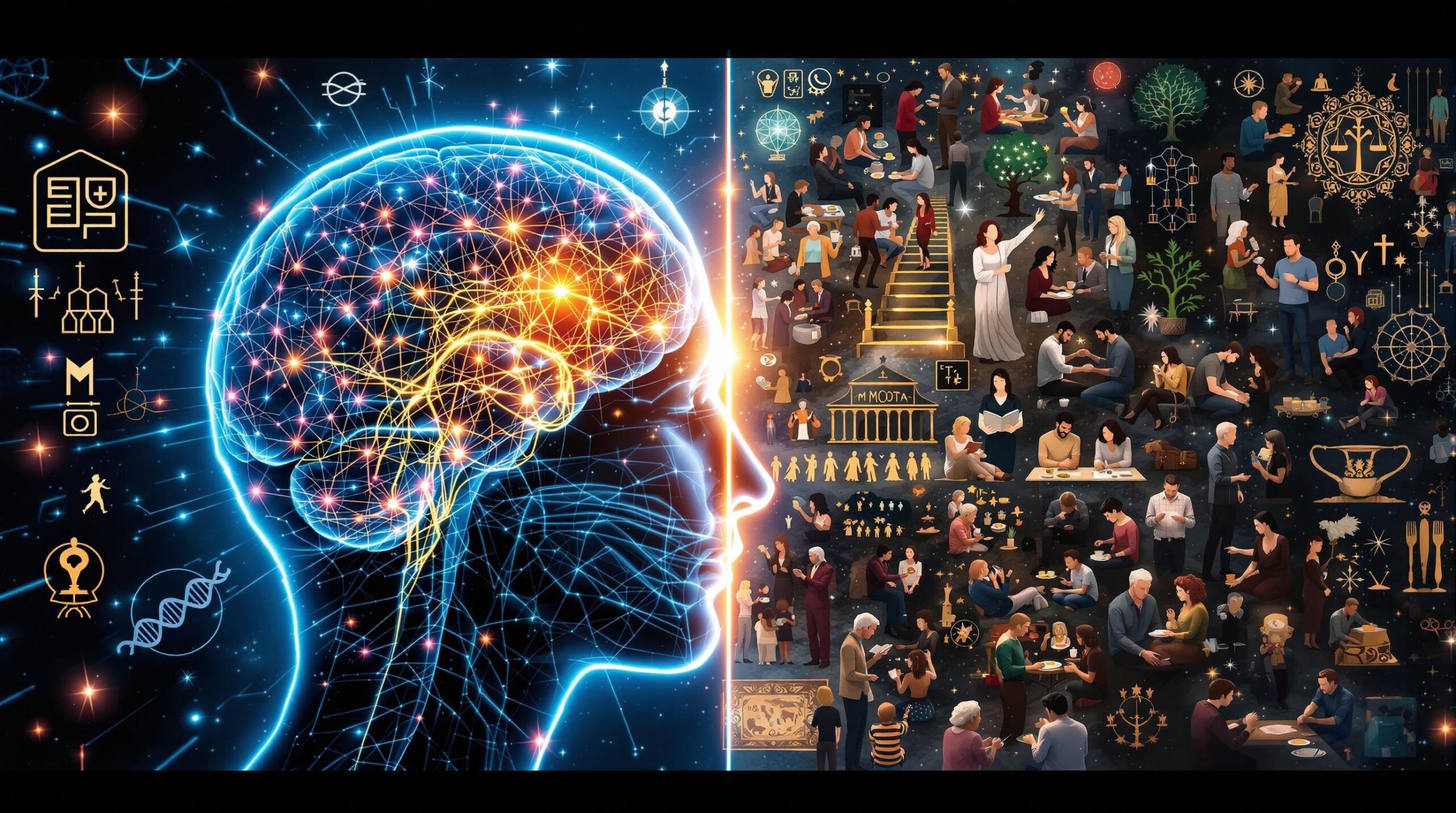Between 2007 and 2022, American views on morality underwent a dramatic reversal. In 2007, over half of Americans believed God was essential for moral behavior. By 2022, a majority concluded that belief in God is not necessary to be moral and have good values. This shift reflects both scientific advances in understanding morality’s biological roots and ongoing philosophical debates about whether ethical obligations can exist independently of divine foundations.
The question of whether morality can exist without God is not merely academic. It shapes how leaders ground organizational values, how professionals navigate ethical dilemmas, and how diverse teams find common ground on questions of integrity and accountability. Understanding what evolutionary biology, primatology, and philosophical analysis reveal about this question offers discernment for principled decision-making.
Can morality exist without God is not asking whether atheists behave ethically. Rather, it examines whether moral truths exist objectively, independent of human opinion, without divine grounding.
Quick Answer: Morality can exist without God from a functional standpoint—primates and humans demonstrate prosocial behaviors that evolved through natural selection to promote group survival. However, philosophers debate whether evolved moral instincts constitute genuine objective obligations or merely describe prevalent preferences shaped by evolutionary advantage.
Definition: Secular morality is a framework of ethical principles and behaviors that operates independently of religious belief, grounded in evolutionary instincts, rational principles, or social contracts rather than divine command.
Key Evidence: According to primatologist Frans de Waal, experiments demonstrate that primates perform favors without self-benefit, suggesting innate prosocial behaviors evolved to promote group survival.
Context: The question distinguishes between moral behavior (which atheists clearly exhibit) and objective moral grounding (whether duties exist independently of human opinion).
Secular morality works because it externalizes evolved social instincts into explicit principles, creating consistency in decision-making before pressure hits. When leaders establish ethical frameworks grounded in character and stakeholder consideration, they reduce cognitive load during dilemmas and build trust through predictable behavior. The benefit comes from principled commitment, not from resolving metaphysical questions about ultimate foundations. What follows examines what evolutionary biology reveals about morality’s origins, the philosophical challenges of objective ethics without divine grounding, and how professionals can navigate ethical complexity regardless of their metaphysical beliefs.
Key Takeaways
- Evolutionary evidence shows prosocial behaviors in primates without religious instruction, suggesting morality’s natural origins through millions of years of social cooperation.
- Public opinion shifted dramatically between 2007 and 2022, with most Americans now concluding belief in God is not necessary for moral values.
- Philosophical debates center on whether evolved preferences constitute genuine moral obligations beyond survival advantage or merely describe behavioral patterns.
- Hume’s Law establishes the challenge of deriving “ought” from “is”—moral duties from biological facts about what promotes survival.
- Practical ethics operate effectively amid metaphysical uncertainty, as both religious and secular frameworks can ground integrity-driven decision-making.
What Science Reveals About Morality’s Origins
Primatology research provides compelling evidence that the building blocks of morality existed long before human religious traditions. Research by primatologist Frans de Waal demonstrates that cooperation, reciprocity, and fairness behaviors appear in primate societies without religious instruction. In controlled experiments, primates perform favors without self-benefit and intervene to protect weaker group members—behaviors that mirror human moral instincts.
Maybe you’ve wondered why fairness feels instinctive, why betrayal stings even when no rule was technically broken. The answer traces back further than written codes or religious texts. According to Frans de Waal, “almost all religious dogma is based on the codification of evolved behaviors” and “behaviors which promote human survival are ‘good.’” This perspective suggests that what we recognize as moral behavior emerged through natural selection as groups with stronger prosocial instincts outcompeted those lacking such traits.
Cooperation, empathy, and fairness weren’t handed down from divine command but refined through millions of years of social living where group cohesion meant survival. Evolutionary biology establishes that moral behavior predates human religious traditions and may be embedded in neural circuitry shaped by millions of years of social evolution. These findings provide empirical grounds for morality originating through natural selection rather than divine revelation.
The evidence suggests that humans inherited moral instincts from primate ancestors, then elaborated those instincts through culture, language, and reflection. However, evolutionary accounts explain the development of moral beliefs but leave open questions about moral truths. Showing that cooperation aided ancestral survival doesn’t establish whether we ought to cooperate now, particularly when defection might benefit us personally. The gap between describing how moral instincts arose and prescribing moral obligations remains philosophically significant.

The Shift in Cultural Attitudes
By 2022, most Americans concluded belief in God is not necessary to be moral and have good values, reversing views held just fifteen years earlier. This pattern appears strongest in advanced economies with high educational attainment, where exposure to evolutionary science and secular philosophy has grown. The shift demonstrates growing secular confidence in non-theistic ethical frameworks and reflects broader cultural changes in how people understand morality’s foundations.
The Philosophical Challenge of Objective Morality
Theologian Alister McGrath, interpreting C.S. Lewis’s moral argument, articulates the theistic position clearly: “Objective moral truths are quite unlike ‘laws of nature’ or ‘natural’ facts.” This distinction matters because moral truths carry prescriptive force—they tell us what we ought to do—in ways that physical laws describing what is the case do not.
A law of physics describes how objects behave. A moral law prescribes how persons should behave. The difference is not trivial. According to philosopher William Lane Craig, moral violations invoke punishment and accountability in ways mathematical or logical errors do not. If you miscalculate a sum, you’ve made a mistake. If you betray a trust, you’ve committed a wrong that merits blame and potentially punishment.
This distinguishes moral obligation from other abstract truths, demonstrating that morality involves personal accountability and character assessment, not just intellectual recognition of facts. Hume’s Law—the principle that one cannot derive “ought” from “is”—presents a fundamental challenge to evolutionary ethics, as biological facts about survival don’t automatically generate moral duties. Knowing that cooperation enhanced ancestral fitness doesn’t establish that we ought to cooperate in situations where defection would benefit us.
One common pattern looks like this: A leader recognizes that honesty promotes trust and long-term relationships. She also knows that in a specific negotiation, misrepresenting her position would secure a better deal with minimal detection risk. The evolutionary account explains why honesty feels right—it promoted ancestral group cohesion. But it doesn’t resolve whether she should be honest now, when circumstances differ from ancestral conditions and personal advantage points toward deception.
The logical gap between descriptive claims about what aided survival and prescriptive claims about what we should do remains unresolved in naturalistic frameworks. Philosopher Jean-Paul Sartre observed: “There can no longer be an a priori Good, since there is no infinite and perfect consciousness to think it.” This highlights the difficulty of maintaining that moral truths are both objective (true regardless of human opinion) and grounded in nothing beyond human consciousness.
If moral facts depend on human minds, they seem subjective. If they exist independently, what grounds them without God? The debate centers not on whether atheists can behave morally—virtually all parties agree they can—but whether morality has objective grounding without God. Atheists clearly exhibit ethical behavior, often exemplifying integrity and compassion. The philosophical question concerns whether moral obligations exist as objective facts or function as useful fictions we adopt for social cohesion.
Where Consensus Exists
Humans across cultures share remarkably similar moral intuitions about justice, fairness, and protection of innocents. Both evolutionary and theistic perspectives acknowledge these shared intuitions as real and significant. The disagreement concerns ultimate grounding: whether intuitions reflect evolved preferences, divine commands, rational principles, or social contracts. This consensus on moral intuitions provides practical common ground despite metaphysical disagreement about foundations.
Practical Implications for Ethics and Decision-Making
Understanding evolved prosocial preferences helps explain why stakeholder engagement and transparent communication feel intuitively right—they align with neural patterns refined through ancestral cooperation. When leaders prioritize collaboration over pure self-interest, they’re tapping into instincts shaped by millions of years where group cohesion meant survival. This validates approaches emphasizing trust-building and long-term relationships rather than transactional thinking.
However, evolutionary accounts don’t automatically generate moral obligations. A common mistake involves assuming that because cooperation evolved to enhance survival, we therefore ought to cooperate in current situations. This commits what philosophers call the naturalistic fallacy—deriving “ought” from “is.” The fact that honesty promoted ancestral fitness doesn’t establish current obligation to honesty, particularly when deception might benefit us and detection seems unlikely.
Leaders cannot simply appeal to evolutionary advantage to justify ethical decisions; principled frameworks require additional grounding beyond survival instincts. Stronger ethical arguments appeal to character, trust-building, long-term relationships, and principled commitments that transcend immediate calculation. When facing pressure to misrepresent capabilities to stakeholders, recognizing the evolved temptation toward self-serving behavior doesn’t excuse it. The decision to prioritize integrity reflects commitment to standards transcending evolutionary calculus.
The Golden Rule—treating others as you wish to be treated—appears across religious and philosophical traditions precisely because it captures a rational principle operating independently of divine grounding. Leaders can invoke such principles to unite diverse teams around shared commitments while respecting differences in metaphysical beliefs. The principle works whether you believe God commands it or rational reflection reveals it.
Organizations effectively use hybrid ethical frameworks: drawing on evolved moral intuitions about fairness while appealing to transcendent principles like human dignity, justice, and accountability. This pragmatic approach enables diverse teams to collaborate on ethical decision-making without requiring consensus on ultimate grounding questions. Best practice involves establishing principled frameworks that transcend immediate advantage calculation, creating consistency before pressure hits.
You might notice that the most trusted leaders maintain ethical commitments even when calculations of advantage point elsewhere. Functional ethics operate amid metaphysical uncertainty—the question of whether morality ultimately requires God need not paralyze ethical action. Both religious and secular leaders make sound ethical decisions daily by focusing on character, stakeholder consideration, and long-term thinking rather than resolving abstract philosophical debates.
The wisdom lies in practicing discernment: understand morality’s biological roots while maintaining commitment to integrity that transcends calculation of advantage. When you establish clear principles before dilemmas arise, you reduce the cognitive load of real-time ethical reasoning under pressure. That preparation matters more than settling metaphysical foundations.
Why Can Morality Exist Without God Matters
This question matters because how leaders ground ethical frameworks shapes organizational culture, stakeholder trust, and long-term sustainability. If morality requires divine grounding, secular organizations face challenges articulating why integrity matters beyond compliance or advantage. If morality can stand on evolutionary and rational foundations, diverse teams can find common ethical ground despite metaphysical differences. The practical implications extend to how professionals navigate dilemmas, build accountability structures, and maintain principled commitments under pressure.
Conclusion
Can morality exist without God? The answer depends on what we mean by “exist.” Functionally, yes—moral behavior clearly operates in individuals and societies without religious belief, supported by evolutionary evidence showing prosocial instincts in primates and the dramatic shift in public attitudes between 2007 and 2022. Philosophically, the question of objective moral grounding remains contested between naturalistic frameworks emphasizing evolved preferences and theistic perspectives emphasizing divine command or transcendent principles.
For practical purposes, both religious and secular individuals can uphold rigorous ethical standards, drawing on evolved moral intuitions while subjecting them to principled scrutiny using frameworks emphasizing character, stakeholder consideration, and long-term thinking. The wisdom lies in practicing discernment: understand morality’s biological roots while maintaining commitment to integrity that transcends immediate calculation.
Whether morality ultimately requires divine grounding or can stand on evolutionary and rational foundations alone, the imperative to act ethically remains binding for leaders navigating complexity with integrity. The question invites reflection, but it need not paralyze action. What matters most is the consistency of your commitments when pressure tests them.
Related resources: Explore moral psychology for deeper understanding of how ethical reasoning develops. See practical perspectives on philosophical viewpoints for frameworks bridging diverse beliefs. Review ethics and the divine for theological dimensions of this ongoing conversation.
Frequently Asked Questions
What does secular morality mean?
Secular morality is a framework of ethical principles and behaviors that operates independently of religious belief, grounded in evolutionary instincts, rational principles, or social contracts rather than divine command.
Can atheists be moral without believing in God?
Yes, atheists clearly exhibit ethical behavior and often exemplify integrity and compassion. The question isn’t whether atheists behave morally—virtually all parties agree they can—but whether moral obligations exist as objective facts without divine grounding.
What is Hume’s Law in moral philosophy?
Hume’s Law states that you cannot derive “ought” from “is”—meaning you can’t automatically generate moral duties from biological facts. Knowing that cooperation enhanced ancestral fitness doesn’t establish that we ought to cooperate in current situations.
How do primates show moral behavior without religion?
Research by primatologist Frans de Waal demonstrates that primates perform favors without self-benefit and intervene to protect weaker group members. These prosocial behaviors mirror human moral instincts and evolved through natural selection to promote group survival.
What is the difference between moral behavior and objective moral grounding?
Moral behavior refers to ethical actions people take regardless of their beliefs. Objective moral grounding questions whether moral truths exist independently of human opinion—whether duties are real facts or useful preferences we adopt for social cohesion.
How did American views on morality and God change between 2007 and 2022?
In 2007, over half of Americans believed God was essential for moral behavior. By 2022, a majority concluded that belief in God is not necessary to be moral and have good values, reflecting growing secular confidence in non-theistic ethical frameworks.
Sources
- Embrace the Truth – Analysis of theological and philosophical arguments regarding objective morality and divine grounding, including perspectives from C.S. Lewis, William Lane Craig, and Jean-Paul Sartre
- National Humanities Center – Frans de Waal’s primatology research on evolutionary origins of moral behavior and prosocial instincts in non-human primates
- PubMed Central – 2007 Pew Research data on American beliefs about the relationship between God and morality
- Pew Research Center – 2022 survey data showing shifts in public opinion regarding belief in God as necessary for moral values across advanced economies


